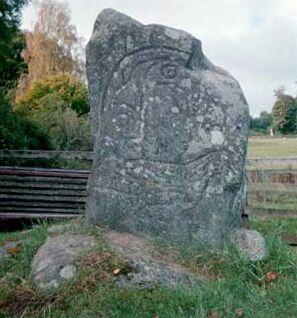History of Scotland
History of Scotland
The History of Scotland encompasses the origins, evolution, and transformations of the region known as Scotland from its ancient beginnings to the present day. The history of this nation is marked by invasions, battles for independence, periods of peace and conflict, and significant cultural and political developments.
Prehistoric Scotland[edit | edit source]
The story of Scotland begins with the end of the last Ice Age, around 10,000 BC, when hunter-gatherers started to inhabit the area. The construction of megaliths and stone circles in the Neolithic period, such as those at Callanish and Maeshowe, demonstrates the early presence of complex societies and religious practices.
Roman Scotland[edit | edit source]
The first written records of Scotland come from the Roman Empire's attempts to conquer parts of the island of Great Britain. The Romans referred to the area north of their province of Britannia as Caledonia. Despite building the Antonine Wall and Hadrian's Wall to secure their territory, the Romans never fully subdued the Caledonian tribes.
Early Medieval Scotland[edit | edit source]
The early medieval period saw the emergence of the Picts, Gaels, and Scots. The Kingdom of Alba, which later became known as Scotland, was formed in the 9th century by the union of Picts and Scots under King Kenneth MacAlpin. This period was marked by the spread of Christianity, the flourishing of monastic culture, and the establishment of enduring political institutions.
High Middle Ages[edit | edit source]
During the High Middle Ages, Scotland experienced significant growth and development. The Davidian Revolution, initiated by David I of Scotland, introduced feudalism and promoted the growth of towns, trade, and agriculture. The period also saw the foundation of the University of St Andrews, the oldest university in Scotland, in 1413.
Wars of Scottish Independence[edit | edit source]
The late 13th and early 14th centuries were dominated by the Wars of Scottish Independence against England. Figures such as William Wallace and Robert the Bruce emerged as national heroes. The Battle of Bannockburn in 1314 was a significant Scottish victory, and the Declaration of Arbroath in 1320 asserted Scotland's independence.
The Stewart Dynasty[edit | edit source]
The Stewart Dynasty began with Robert II of Scotland in 1371 and was marked by periods of internal strife and conflict with England. The union of the crowns under James VI of Scotland, who also became James I of England in 1603, brought the countries under a single monarch but did not unify their governments.
The Jacobite Risings[edit | edit source]
The 17th and early 18th centuries were marked by the Jacobite Risings, attempts by the Stuart kings to regain the thrones of Scotland, England, and Ireland. The most notable of these was the Jacobite Rising of 1745, led by Charles Edward Stuart, which ended in defeat at the Battle of Culloden in 1746.
The Act of Union[edit | edit source]
The Act of Union 1707 united the parliaments of Scotland and England, creating the Kingdom of Great Britain. This union was controversial and met with opposition in Scotland, but it also opened up new trade opportunities and was a step towards the creation of the United Kingdom.
Industrial Revolution and Modern Period[edit | edit source]
Scotland played a significant role in the Industrial Revolution, with advancements in technology, engineering, and social reform. The 19th and 20th centuries saw the expansion of the Scottish economy, the development of a distinct Scottish culture, and contributions to the British Empire. In recent decades, the question of Scottish independence has re-emerged as a significant political issue, leading to a referendum in 2014 where the majority voted to remain part of the United Kingdom.
Conclusion[edit | edit source]
The history of Scotland is a complex tapestry of struggle, innovation, and identity. From its ancient beginnings to its role in the modern world, Scotland has maintained a distinct national character while contributing significantly to broader political, cultural, and economic developments.
Search WikiMD
Ad.Tired of being Overweight? Try W8MD's physician weight loss program.
Semaglutide (Ozempic / Wegovy and Tirzepatide (Mounjaro / Zepbound) available.
Advertise on WikiMD
|
WikiMD's Wellness Encyclopedia |
| Let Food Be Thy Medicine Medicine Thy Food - Hippocrates |
Translate this page: - East Asian
中文,
日本,
한국어,
South Asian
हिन्दी,
தமிழ்,
తెలుగు,
Urdu,
ಕನ್ನಡ,
Southeast Asian
Indonesian,
Vietnamese,
Thai,
မြန်မာဘာသာ,
বাংলা
European
español,
Deutsch,
français,
Greek,
português do Brasil,
polski,
română,
русский,
Nederlands,
norsk,
svenska,
suomi,
Italian
Middle Eastern & African
عربى,
Turkish,
Persian,
Hebrew,
Afrikaans,
isiZulu,
Kiswahili,
Other
Bulgarian,
Hungarian,
Czech,
Swedish,
മലയാളം,
मराठी,
ਪੰਜਾਬੀ,
ગુજરાતી,
Portuguese,
Ukrainian
Medical Disclaimer: WikiMD is not a substitute for professional medical advice. The information on WikiMD is provided as an information resource only, may be incorrect, outdated or misleading, and is not to be used or relied on for any diagnostic or treatment purposes. Please consult your health care provider before making any healthcare decisions or for guidance about a specific medical condition. WikiMD expressly disclaims responsibility, and shall have no liability, for any damages, loss, injury, or liability whatsoever suffered as a result of your reliance on the information contained in this site. By visiting this site you agree to the foregoing terms and conditions, which may from time to time be changed or supplemented by WikiMD. If you do not agree to the foregoing terms and conditions, you should not enter or use this site. See full disclaimer.
Credits:Most images are courtesy of Wikimedia commons, and templates, categories Wikipedia, licensed under CC BY SA or similar.
Contributors: Prab R. Tumpati, MD





